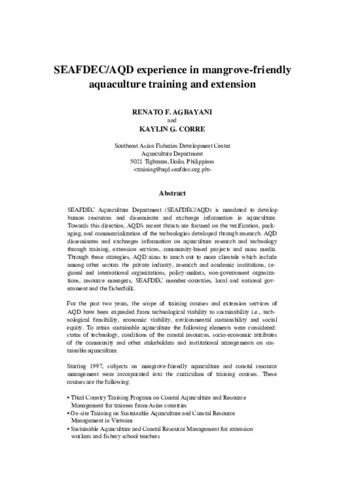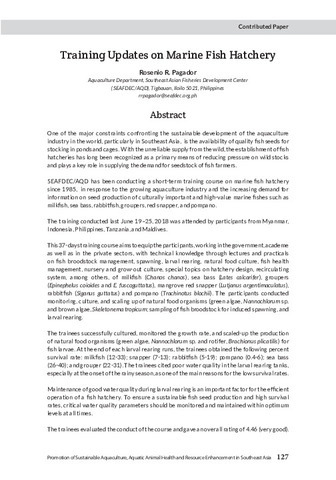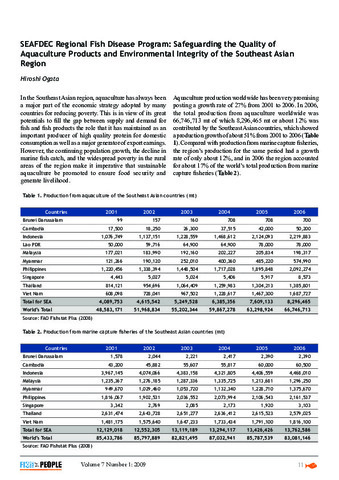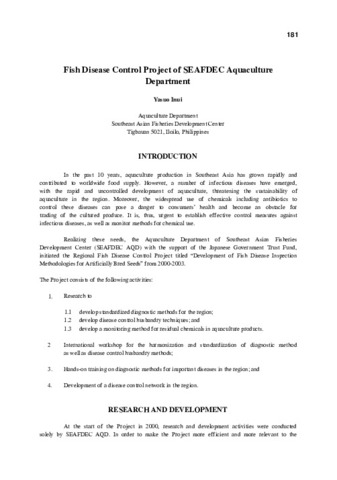Perlihatkan publikasi sederhana
SEAFDEC/AQD experience in mangrove-friendly aquaculture training and extension
| dc.contributor.author | Agbayani, Renato F. | |
| dc.contributor.author | Corre, Kaylin G. | |
| dc.contributor.editor | Primavera, Jurgenne H. | |
| dc.contributor.editor | Garcia, Luis Ma. B. | |
| dc.contributor.editor | Castaños, Milagros T. | |
| dc.contributor.editor | Surtida, Marilyn B. | |
| dc.date.accessioned | 2011-06-22T09:35:56Z | |
| dc.date.available | 2011-06-22T09:35:56Z | |
| dc.date.issued | 2000 | |
| dc.identifier.citation | Agbayani, R. F., & Corre, K. G. (2000). SEAFDEC/AQD experience in mangrove-friendly aquaculture training and extension. In J. H. Primavera, L. M. B. Garcia, M. T. Castaños, & M. B. Surtida (Eds.), Mangrove-Friendly Aquaculture: Proceedings of the Workshop on Mangrove-Friendly Aquaculture organized by the SEAFDEC Aquaculture Department, January 11-15, 1999, Iloilo City, Philippines (pp. 185-190). Tigbauan, Iloilo, Philippines: Southeast Asian Fisheries Development Center, Aquaculture Department. | en |
| dc.identifier.isbn | 9718511423 | |
| dc.identifier.uri | http://hdl.handle.net/10862/459 | |
| dc.description.abstract | SEAFDEC Aquaculture Department (SEAFDEC/AQD) is mandated to develop human resources and disseminate and exchange information in aquaculture. Towards this direction, AQD’s recent thrusts are focused on the verification, packaging, and commercialization of the technologies developed through research. AQD disseminates and exchanges information on aquaculture research and technology through training, extension services, community-based projects and mass media. Through these strategies, AQD aims to reach out to more clientele which include among other sectors the private industry, research and academic institutions, regional and international organizations, policy-makers, non-government organizations, resource managers, SEAFDEC member-countries, local and national government and the fisherfolk.
For the past two years, the scope of training courses and extension services of AQD have been expanded from technological viability to sustainability i.e., technological feasibility, economic viability, environmental sustainability and social equity. To attain sustainable aquaculture the following elements were considered: status of technology, conditions of the coastal resources, socio-economic attributes of the community and other stakeholders and institutional arrangements on sustainable aquaculture.
Starting 1997, subjects on mangrove-friendly aquaculture and coastal resource management were incorporated into the curriculum of training courses. These courses are the following:
| en |
| dc.language.iso | en | en |
| dc.publisher | Aquaculture Department, Southeast Asian Fisheries Development Center | en |
| dc.subject | Philippines | en |
| dc.subject.lcc | VF SP 263 | |
| dc.title | SEAFDEC/AQD experience in mangrove-friendly aquaculture training and extension | en |
| dc.type | Conference paper | en |
| dc.citation.spage | 185 | |
| dc.citation.epage | 190 | |
| dc.citation.conferenceTitle | Mangrove-Friendly Aquaculture : Proceedings of the Workshop on Mangrove-Friendly Aquaculture organized by the SEAFDEC Aquaculture Department, January 11-15, 1999, Iloilo City, Philippines | en |
| dc.subject.asfa | participatory approaches | en |
| dc.subject.asfa | training programmes | en |
| dc.subject.asfa | training | en |
| dc.subject.asfa | sustainability | en |
| dc.subject.asfa | aquaculture | en |
| dc.subject.asfa | mangroves | en |
| dc.subject.asfa | technology transfer | en |
| dc.subject.asfa | training centres | en |
Files in this item
Publikasi ini ada di koleksi berikut
-
Mangrove Friendly Aquaculture [18]
Proceedings of the Workshop on Mangrove-Friendly Aquaculture organized by the SEAFDEC Aquaculture Department, January 11-15, 1999, Iloilo City, Philippines





